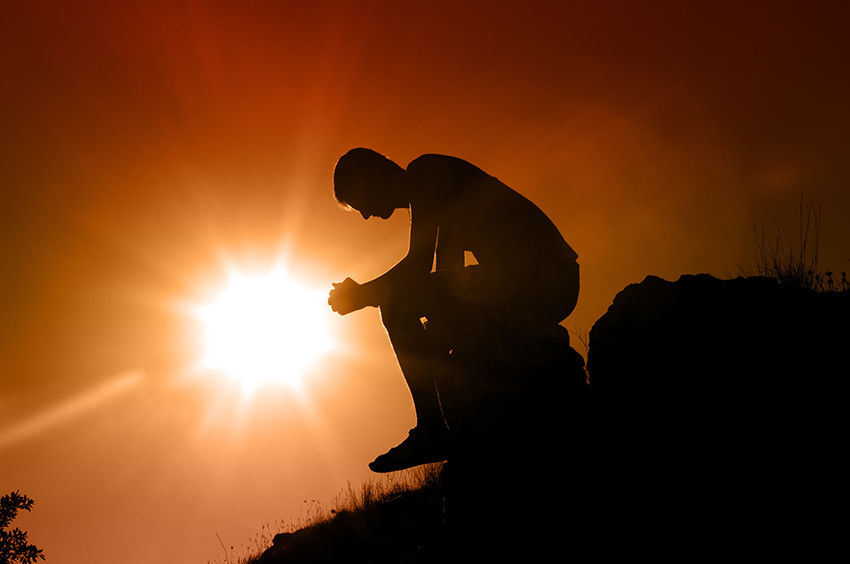Early Christian monks believed in something they called “acedia.” More colloquially, they called it the “noonday devil,” a name that essentially describes the concept. Acedia, for them, was different from ordinary depression in that it didn’t draw you into the dark, chaotic areas of your mind and heart, to have you diseased before your own complex and infinite depth. It was more of a flattening out, a dearth of energy, that put you into a semi vegetative state that simply deadened all deep feeling and thoughts.
The early Church considered it one of the seven capital sins. Later it was renamed as “sloth.” There’s an abundance of good spiritual literature on the concept of acedia, not least Kathleen Norris’ rather definitive work on how acedia was understood by the early Church.
But, until recently, acedia hadn’t been studied in depth as a psychological concept. Happily, that’s changing, with important implications for spirituality. To offer just one example: I recently attended a lecture on acedia given by Jungian specialist Lauren Morgan Wuest. I cannot do justice to her full thesis here, but let me risk an oversimplified synopsis.
Having read the literature of the Desert Fathers and the various commentaries on the idea of acedia, she attempted to interface that spiritual literature with the insights of contemporary psychology, particularly those from the Jungian school of thought. What were her conclusions?
In brief, her view is that acedia is not a clinical diagnosis, meaning that it isn’t a pathology requiring treatment, nor is it an ordinary depression. Rather, the symptoms of acedia are the result of a healthy instinctual reflex of our bodies and minds which, when they are not given something they need, sometimes forcefully shut us down, much like an ordinary depression shuts someone down. In the case of acedia, the shutdown of energy is for the purpose of health. Simplistically put, because we won’t sit down on our own and give our bodies and minds the rest, nourishment and space they need, our bodies and minds conspire together to sit us down, forcibly. In essence, that’s acedia and, in essence, it’s for our own health.
As a psychologist, she didn’t go on to draw out the potential ramifications of this for spirituality, particularly how this might relate to the practice of Sabbath in our lives, but all the implications are there.
When you read the Judeo-Christian Scriptures, particularly the early sections in Genesis which chronicle the creation of the world and how God “rested” on the Sabbath, you see that there’s a divinely ordered rhythm to how work and rest are supposed to unfold in our lives. Briefly stated, there’s to be pattern, a rhythm, to our lives which works this way:
“You work for six days, and then have a one-day sabbatical; you work for seven years, and then have a one-year sabbatical; you work for seven times seven years, and then have a jubilee year, a sabbatical for the whole planet; and then you work for a lifetime, and go on an eternity of sabbatical.”
In essence, our lives of work, our everyday agenda, and our normal anxieties, are to be regularly punctuated by a time in which we lay down the hammer, lay down our agenda, lay down our work-a-day worries and simply sit, rest, vegetate, enjoy, soak-in, luxuriate, contemplate, pray and let things take care of themselves for a while. That’s the biblical formula for health: spiritual, human, psychic and bodily. And whenever we don’t do this voluntarily, in effect, whenever we neglect to do Sabbath in our lives, our bodies and minds are likely to do it for us by shutting down our energies. Acedia is our friend here — we will do Sabbath, one way or the other.
It’s no secret that today the practice of Sabbath is more and more disappearing within our culture. Indeed, our culture constitutes a virtual conspiracy against the practice of Sabbath. Among the many culprits responsible for this, I highlight our addiction to information technology, our current inability to go for any stretch of time without being connected to others and the world through a phone, a commuter pad or a computer screen. We are finding ourselves less and less able to step away from all that we are connected to through information technology, and consequently we are finding ourselves less and less able to simply rest, to let go of things and be in Sabbath-mode. Perhaps the most important ascetical practice for us today would be the practice of cyber-Sabbaths.
Already 700 years ago, the Sufi poet, Rumi, lamented: “I have lived too long where I can be reached!” That’s a cry for Sabbath time that went up long before today’s information technology placed us where we can always be reached, and that cry is going up everywhere today as our addiction to information technology increases. One worries that we will not find the asceticism needed to curb our addiction, but then acedia may well do for us what we cannot do for ourselves.
Oblate of Mary Immaculate Father Ronald Rolheiser is a specialist in the field of spirituality and systematic theology. His website is www.ronrolheiser.com.

